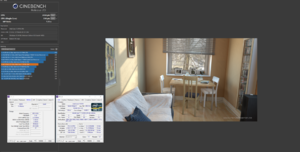Agreed. Clock for clock measurements seemed interesting back in the PIII vs Athlon days, but we have kind of learned a lot since then.
Some architectures allow for higher clocks, others don't. It only makes sense to consider how an architecture oerforms when clocked as high as it will go. Any other measure is not really valuable.
You can have the highest IPC CPU in the world, but if it's stuck at 200Mhz, it's probably not going to be a great performer in 2019. It makes next to no sense to slow other architectures down to 200mhz to see how they perform.
I ran them at both the same clocks and their standard base / boost clocks as well as overclocked as high as I could take them. I think that the only real metric that matters is how they perform at base / boost clocks for people who don't overclock and at overclocked speeds for those who do. The latter crowd needs both numbers to know that their performance will fall somewhere in between depending on what they can achieve. The clock for clock IPC comparisons are interesting. However, they are more for back ground and to satisfy curiosity than anything else. That information does tell a story on its own. What I saw was that often times, Intel only had a lead over AMD where it did due to the clock speed advantage. This tells us that AMD's IPC is generally on par with Intel's if not greater.
This is actually a repeat of situations we've seen before. Back in the day, the Cyrix 6x86 PR200+ was generally faster than Intel's Pentium 200MHz CPU at a mere 150MHz. It obviously had a weak FPU implementation that caused it to suffer in games, but generally speaking it had greater IPC. AMD's K5 was sort of the same way as it had lower clocks than Intel and Cyrix, but still managed to do better per clock. It just didn't clock worth a damn. Today, we have AMD at lower clocks competing very well with a more highly clocked Intel product. AMD often beats Intel at lower clocks and people simply want to understand why. Sometimes its just due to a core count advantage, but other times its due to the way the architecture is built and its features, such as L3 cache sizes, etc. make a big difference in certain applications.
So why do we care? Why do we even talk about IPC? For the same reason we talk about the architecture or feature improvements. It's done because people reading this stuff are interested in how things work. It's why car sites and magazines talk about the engine specs or drive train details of a car rather than just post track times and fuel economy data. It adds context which can be helpful but it also satisfies curiosity, increases product knowledge and if nothing else, it entertains people. The more you know, the more you can understand how the product may perform for your specific needs. Its also helpful because some people might just look at Intel's Core i9 9900K specs and see a 5.0GHz boost clock and assume its all around faster than AMD's Ryzen 9 3900X when it isn't.
Listen, I don't care how the performance is achieved. I don't care if we have a 3GHz processor that nets me 240FPS in Destiny 2 @ 4K or a 5.5GHz processor that does the same thing. As long as both get the job done with reasonable cooling and at a reasonable price, I couldn't care less how the target performance was achieved. However, I find it extremely interesting to know how it was achieved even though its only the end result that truly matters. People are naturally curious to know how and why things are the way they are. In this case, a direct IPC comparison is helpful for that. Additional context like that may also help answer questions later that you didn't know to ask now.
![[H]ard|Forum](/styles/hardforum/xenforo/logo_dark.png)
